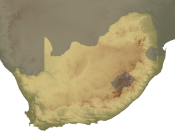Economics 314 Make-up Assignment
Paul Robertson
G11r1064
According to Smit (2008:89) South Africa has historically been influenced heavily by the balance-of-payments flows, this stems from it being a small open-economy as well has high in natural resources allowing large exports of raw materials. Because South Africa had a large share in the international trade of gold, a large portion of its GDP came from gold and other metals. Mining accounted for 21% of GDP in 1970, however in recent times it has fallen to only 6%, however because of the large share of GDP being from mining South Africa developed a dependency and a reliance on its exports of these metals in order to finance its spending (ADB, 2009:10).
Another reason and through analysis of historical data SARB (28:2013) for South Africa's dependency on foreign Capital inflows is that South Africa's current deficit has historically been large and therefore has needed foreign direct investment in order to finance this debt and enable South Africa to still invest in infrastructure and technology in order to stimulate growth (Mohamed,2012:2).Since
1994 South Africa has also opened up the economy and implemented many orthodox economic policies, these were in the hopes of attracting even more FDI. Mohamed (2012:8) argues that opening up the economy results in South Africa's economy becoming increasingly volatile, therefore it is increasingly important that opening up the economy does indeed attract foreign investment, or else the policy changes lead to more volatility with nothing to show for it. Some of these policy liberalisations included the abolition of exchange controls on all current account transactions as well as exchange controls on non-residents, Global leniency in regards to outward FDI and overall progressive relaxation of controls.
It is therefore clear that South Africa needs the FDI in order to finance its current-account-deficit...


